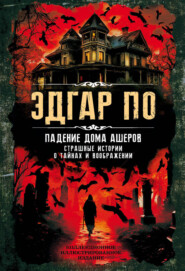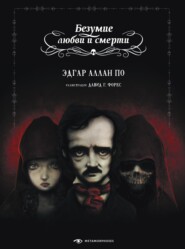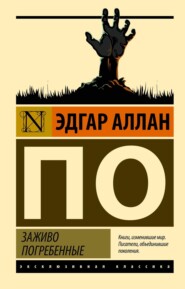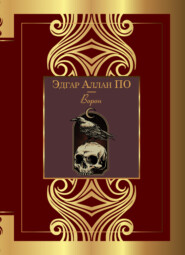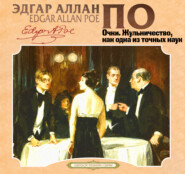По всем вопросам обращайтесь на: info@litportal.ru
(©) 2003-2024.
✖
The Complete Stories of Edgar Allan Poe
Настройки чтения
Размер шрифта
Высота строк
Поля
Frederick, Baron Metzengerstein, was, on the other hand, not yet of age. His father, the Minister G —, died young. His mother, the Lady Mary, followed him quickly. Frederick was, at that time, in his eighteenth year. In a city, eighteen years are no long period; but in a wilderness – in so magnificent a wilderness as that old principality, the pendulum vibrates with a deeper meaning.
From some peculiar circumstances attending the administration of his father, the young Baron, at the decease of the former, entered immediately upon his vast possessions. Such estates were seldom held before by a nobleman of Hungary. His castles were without number. The chief in point of splendor and extent was the “Palace Metzengerstein.” The boundary line of his dominions was never clearly defined; but his principal park embraced a circuit of fifty miles.
Upon the succession of a proprietor so young, with a character so well known, to a fortune so unparalleled, little speculation was afloat in regard to his probable course of conduct. And, indeed, for the space of three days, the behavior of the heir out-heroded Herod, and fairly surpassed the expectations of his most enthusiastic admirers. Shameful debaucheries – flagrant treacheries – unheard-of atrocities – gave his trembling vassals quickly to understand that no servile submission on their part – no punctilios of conscience on his own – were thenceforward to prove any security against the remorseless fangs of a petty Caligula. On the night of the fourth day, the stables of the Castle Berlifitzing were discovered to be on fire; and the unanimous opinion of the neighborhood added the crime of the incendiary to the already hideous list of the Baron’s misdemeanors and enormities.
But during the tumult occasioned by this occurrence, the young nobleman himself sat apparently buried in meditation, in a vast and desolate upper apartment of the family palace of Metzengerstein. The rich although faded tapestry hangings which swung gloomily upon the walls, represented the shadowy and majestic forms of a thousand illustrious ancestors. Here, rich-ermined priests, and pontifical dignitaries, familiarly seated with the autocrat and the sovereign, put a veto on the wishes of a temporal king, or restrained with the fiat of papal supremacy the rebellious sceptre of the Arch-enemy. There, the dark, tall statures of the Princes Metzengerstein – their muscular war-coursers plunging over the carcasses of fallen foes – startled the steadiest nerves with their vigorous expression; and here, again, the voluptuous and swan-like figures of the dames of days gone by, floated away in the mazes of an unreal dance to the strains of imaginary melody.
But as the Baron listened, or affected to listen, to the gradually increasing uproar in the stables of Berlifitzing – or perhaps pondered upon some more novel, some more decided act of audacity – his eyes were turned unwittingly to the figure of an enormous, and unnaturally colored horse, represented in the tapestry as belonging to a Saracen ancestor of the family of his rival. The horse itself, in the foreground of the design, stood motionless and statue-like – while, farther back, its discomfited rider perished by the dagger of a Metzengerstein.
On Frederick’s lip arose a fiendish expression, as he became aware of the direction which his glance had, without his consciousness, assumed. Yet he did not remove it. On the contrary, he could by no means account for the overwhelming anxiety which appeared falling like a pall upon his senses. It was with difficulty that he reconciled his dreamy and incoherent feelings with the certainty of being awake. The longer he gazed, the more absorbing became the spell – the more impossible did it appear that he could ever withdraw his glance from the fascination of that tapestry. But the tumult without becoming suddenly more violent, with a compulsory exertion he diverted his attention to the glare of ruddy light thrown full by the flaming stables upon the windows of the apartment.
The action, however, was but momentary; his gaze returned mechanically to the wall. To his extreme horror and astonishment, the head of the gigantic steed had, in the meantime, altered its position. The neck of the animal, before arched, as if in compassion, over the prostrate body of its lord, was now extended, at full length, in the direction of the Baron. The eyes, before invisible, now wore an energetic and human expression, while they gleamed with a fiery and unusual red; and the distended lips of the apparently enraged horse left in full view his sepulchral and disgusting teeth.
Stupified with terror, the young nobleman tottered to the door. As he threw it open, a flash of red light, streaming far into the chamber, flung his shadow with a clear outline against the quivering tapestry; and he shuddered to perceive that shadow – as he staggered awhile upon the threshold – assuming the exact position, and precisely filling up the contour, of the relentless and triumphant murderer of the Saracen Berlifitzing.
To lighten the depression of his spirits, the Baron hurried into the open air. At the principal gate of the palace he encountered three equerries. With much difficulty, and at the imminent peril of their lives, they were restraining the convulsive plunges of a gigantic and fiery-colored horse.
“Whose horse? Where did you get him?” demanded the youth, in a querulous and husky tone, as he became instantly aware that the mysterious steed in the tapestried chamber was the very counterpart of the furious animal before his eyes.
“He is your own property, sire,” replied one of the equerries, “at least he is claimed by no other owner. We caught him flying, all smoking and foaming with rage, from the burning stables of the Castle Berlifitzing. Supposing him to have belonged to the old Count’s stud of foreign horses, we led him back as an estray. But the grooms there disclaim any title to the creature; which is strange, since he bears evident marks of having made a narrow escape from the flames.
“The letters W. V. B. are also branded very distinctly on his forehead,” interrupted a second equerry, “I supposed them, of course, to be the initials of Wilhelm Von Berlifitzing – but all at the castle are positive in denying any knowledge of the horse.”
“Extremely singular!” said the young Baron, with a musing air, and apparently unconscious of the meaning of his words. “He is, as you say, a remarkable horse – a prodigious horse! although, as you very justly observe, of a suspicious and untractable character; let him be mine, however,” he added, after a pause, “perhaps a rider like Frederick of Metzengerstein, may tame even the devil from the stables of Berlifitzing.”
“You are mistaken, my lord; the horse, as I think we mentioned, is not from the stables of the Count. If such had been the case, we know our duty better than to bring him into the presence of a noble of your family.”
“True!” observed the Baron, drily; and at that instant a page of the bed-chamber came from the palace with a heightened color, and a precipitate step. He whispered into his master’s ear an account of the sudden disappearance of a small portion of the tapestry, in an apartment which he designated; entering, at the same time, into particulars of a minute and circumstantial character; but from the low tone of voice in which these latter were communicated, nothing escaped to gratify the excited curiosity of the equerries.
The young Frederick, during the conference, seemed agitated by a variety of emotions. He soon, however, recovered his composure, and an expression of determined malignancy settled upon his countenance, as he gave peremptory orders that the apartment in question should be immediately locked up, and the key placed in his own possession.
“Have you heard of the unhappy death of the old hunter Berlifitzing?” said one of his vassals to the Baron, as, after the departure of the page, the huge steed which that nobleman had adopted as his own, plunged and curveted, with redoubled fury, down the long avenue which extended from the palace to the stables of Metzengerstein.
“No!” said the Baron, turning abruptly toward the speaker, “dead! say you?”
“It is indeed true, my lord; and, to the noble of your name, will be, I imagine, no unwelcome intelligence.”
A rapid smile shot over the countenance of the listener. “How died he?”
“In his rash exertions to rescue a favorite portion of his hunting stud, he has himself perished miserably in the flames.”
“I-n-d-e-e-d-!” ejaculated the Baron, as if slowly and deliberately impressed with the truth of some exciting idea.
“Indeed;” repeated the vassal.
“Shocking!” said the youth, calmly, and turned quietly into the palace.
From this date a marked alteration took place in the outward demeanor of the dissolute young Baron Frederick Von Metzengerstein. Indeed, his behaviour disappointed every expectation, and proved little in accordance with the views of many a manœuvering mamma; while his habits and manner, still less than formerly, offered anything congenial with those of the neighboring aristocracy. He was never to be seen beyond the limits of his own domain, and, in this wide and social world, was utterly companionless – unless, indeed, that unnatural, impetuous, and fiery-colored horse, which he henceforward continually bestrode, had any mysterious right to the title of his friend.
Numerous invitations on the part of the neighborhood for a long time, however, periodically came in. “Will the Baron honor our festivals with his presence?” “Will the Baron join us in a hunting of the boar?” – “Metzengerstein does not hunt;” “Metzengerstein will not attend,” were the haughty and laconic answers.
These repeated insults were not to be endured by an imperious nobility. Such invitations became less cordial – less frequent – in time they ceased altogether. The widow of the unfortunate Count Berlifitzing was even heard to express a hope “that the Baron might be at home when he did not wish to be at home, since he disdained the company of his equals; and ride when he did not wish to ride, since he preferred the society of a horse.” This to be sure was a very silly explosion of hereditary pique; and merely proved how singularly unmeaning our sayings are apt to become, when we desire to be unusually energetic.
The charitable, nevertheless, attributed the alteration in the conduct of the young nobleman to the natural sorrow of a son for the untimely loss of his parents; – forgetting, however, his atrocious and reckless behavior during the short period immediately succeeding that bereavement. Some there were, indeed, who suggested a too haughty idea of self-consequence and dignity. Others again (among them may be mentioned the family physician) did not hesitate in speaking of morbid melancholy, and hereditary ill-health; while dark hints, of a more equivocal nature, were current among the multitude.
Indeed, the Baron’s perverse attachment to his lately-acquired charger – an attachment which seemed to attain new strength from every fresh example of the animal’s ferocious and demon-like propensities – at length became, in the eyes of all reasonable men, a hideous and unnatural fervor. In the glare of noon – at the dead hour of night – in sickness or in health – in calm or in tempest – the young Metzengerstein seemed riveted to the saddle of that colossal horse, whose intractable audacities so well accorded with his own spirit.
There were circumstances, moreover, which coupled with late events, gave an unearthly and portentous character to the mania of the rider, and to the capabilities of the steed. The space passed over in a single leap had been accurately measured, and was found to exceed by an astounding difference, the wildest expectations of the most imaginative. The Baron, besides, had no particular name for the animal, although all the rest in his collection were distinguished by characteristic appellations. His stable, too, was appointed at a distance from the rest; and with regard to grooming and other necessary offices, none but the owner in person had ventured to officiate, or even to enter the enclosure of that particular stall. It was also to be observed, that although the three grooms, who had caught the steed as he fled from the conflagration at Berlifitzing, had succeeded in arresting his course, by means of a chain-bridle and noose – yet no one of the three could with any certainty affirm that he had, during that dangerous struggle, or at any period thereafter, actually placed his hand upon the body of the beast. Instances of peculiar intelligence in the demeanor of a noble and high-spirited horse are not to be supposed capable of exciting unreasonable attention, but there were certain circumstances which intruded themselves per force upon the most skeptical and phlegmatic; and it is said there were times when the animal caused the gaping crowd who stood around to recoil in horror from the deep and impressive meaning of his terrible stamp – times when the young Metzengerstein turned pale and shrunk away from the rapid and searching expression of his earnest and human-looking eye.
Among all the retinue of the Baron, however, none were found to doubt the ardor of that extraordinary affection which existed on the part of the young nobleman for the fiery qualities of his horse; at least, none but an insignificant and misshapen little page, whose deformities were in every body’s way, and whose opinions were of the least possible importance. He (if his ideas are worth mentioning at all,) had the effrontery to assert that his master never vaulted into the saddle without an unaccountable and almost imperceptible shudder; and that, upon his return from every long-continued and habitual ride, an expression of triumphant malignity distorted every muscle in his countenance.
One tempestuous night, Metzengerstein, awaking from a heavy slumber, descended like a maniac from his chamber, and, mounting in hot haste, bounded away into the mazes of the forest. An occurrence so common attracted no particular attention, but his return was looked for with intense anxiety on the part of his domestics, when, after some hours’ absence, the stupendous and magnificent battlements of the Palace Metzengerstein, were discovered crackling and rocking to their very foundation, under the influence of a dense and livid mass of ungovernable fire.
As the flames, when first seen, had already made so terrible a progress that all efforts to save any portion of the building were evidently futile, the astonished neighborhood stood idly around in silent, if not apathetic wonder. But a new and fearful object soon riveted the attention of the multitude, and proved how much more intense is the excitement wrought in the feelings of a crowd by the contemplation of human agony, than that brought about by the most appalling spectacles of inanimate matter.
Up the long avenue of aged oaks which led from the forest to the main entrance of the Palace Metzengerstein, a steed, bearing an unbonneted and disordered rider, was seen leaping with an impetuosity which outstripped the very Demon of the Tempest.
The career of the horseman was indisputably, on his own part, uncontrollable. The agony of his countenance, the convulsive struggle of his frame, gave evidence of superhuman exertion: but no sound, save a solitary shriek, escaped from his lacerated lips, which were bitten through and through in the intensity of terror. One instant, and the clattering of hoofs resounded sharply and shrilly above the roaring of the flames and the shrieking of the winds – another, and, clearing at a single plunge the gateway and the moat, the steed bounded far up the tottering staircases of the palace, and, with its rider, disappeared amid the whirlwind of chaotic fire.
The fury of the tempest immediately died away, and a dead calm sullenly succeeded. A white flame still enveloped the building like a shroud, and, streaming far away into the quiet atmosphere, shot forth a glare of preternatural light; while a cloud of smoke settled heavily over the battlements in the distinct colossal figure of – a horse.
THE END
A Tale of Jerusalem (1831)
Intensos rigidam in frontem ascendere canos
Passus erat —
Lucan – De Catone.
– a bristly bore.
“Let us hurry to the walls,” said Abel-Phittim to Buzi-Ben-Levi and Simeon the Pharisee, on the tenth day of the month Thammuz, in the year of the world three thousand nine hundred and forty-one – “let us hasten to the ramparts adjoining the gate of Benjamin, which is in the city of David, and overlooking the camp of the uncircumcised; for it is the last hour of the fourth watch, being sunrise; and the idolaters, in fulfilment of the promise of Pompey, should be awaiting us with the lambs for the sacrifices.”
Simeon, Abel-Phittim, and Buzi-Ben-Levi, were the Gizbarim, or sub-collectors of the offering, in the holy city of Jerusalem.
“Verily,” replied the Pharisee, “let us hasten: for this generosity in the heathen is unwonted; and fickle-mindedness has ever been an attribute of the worshippers of Baal.”
“That they are fickle-minded and treacherous is as true as the Pentateuch,” said Buzi-Ben-Levi, “but that is only towards the people of Adonai. When was it ever known that the Ammonites proved wanting to their own interests? Methinks it is no great stretch of generosity to allow us lambs for the altar of the Lord, receiving in lieu thereof thirty silver shekels per head!”
“Thou forgettest, however, Ben-Levi,” replied Abel-Phittim, “that the Roman Pompey, who is now impiously besieging the city of the Most High, has no assurity that we apply not the lambs thus purchased for the altar, to the sustenance of the body, rather than of the spirit.”
“Now, by the five corners of my beard,” shouted the Pharisee, who belonged to the sect called The Dashers (that little knot of saints whose manner of dashing and lacerating the feet against the pavement was long a thorn and a reproach to less zealous devotees – a stumbling-block to less gifted perambulators) – “by the five corners of that beard which as a priest I am forbidden to shave! – have we lived to see the day when a blaspheming and idolatrous upstart of Rome shall accuse us of appropriating to the appetites of the flesh the most holy and consecrated elements? Have we lived to see the day when” —
“Let us not question the motives of the Philistine,” interrupted Abel-Phittim, “for to-day we profit for the first time by his avarice or by his generosity; but rather let us hurry to the ramparts, lest offerings should be wanting for that altar whose fire the rains of heaven cannot extinguish, and whose pillars of smoke no tempest can turn aside.”
That part of the city to which our worthy Gizbarin now hastened, and which bore the name of its architect King David, was esteemed the most strongly fortified district of Jerusalem; being situated upon the steep and lofty hill of Zion. Here a broad, deep, circumvallatory trench, hewn from the solid rock, was defended by a wall of great strength erected upon its inner edge. This wall was adorned, at regular interspaces, by square towers of white marble; the lowest sixty, and the highest one hundred and twenty cubits in height. But, in the vicinity of the gate of Benjamin, the wall arose by no means from the margin of the fosse. On the contrary, between the level of the ditch and the basement of the rampart, sprang up a perpendicular cliff of two hundred and fifty cubits; forming part of the precipitous Mount Moriah. So that when Simeon and his associates arrived on the summit of the tower called Adoni-Bezek – the loftiest of all the turrets around about Jerusalem, and the usual place of conference with the besieging army – they looked down upon the camp of the enemy from an eminence excelling by many feet, that of the Pyramid of Cheops, and, by several, that of the temple of Belus.
From some peculiar circumstances attending the administration of his father, the young Baron, at the decease of the former, entered immediately upon his vast possessions. Such estates were seldom held before by a nobleman of Hungary. His castles were without number. The chief in point of splendor and extent was the “Palace Metzengerstein.” The boundary line of his dominions was never clearly defined; but his principal park embraced a circuit of fifty miles.
Upon the succession of a proprietor so young, with a character so well known, to a fortune so unparalleled, little speculation was afloat in regard to his probable course of conduct. And, indeed, for the space of three days, the behavior of the heir out-heroded Herod, and fairly surpassed the expectations of his most enthusiastic admirers. Shameful debaucheries – flagrant treacheries – unheard-of atrocities – gave his trembling vassals quickly to understand that no servile submission on their part – no punctilios of conscience on his own – were thenceforward to prove any security against the remorseless fangs of a petty Caligula. On the night of the fourth day, the stables of the Castle Berlifitzing were discovered to be on fire; and the unanimous opinion of the neighborhood added the crime of the incendiary to the already hideous list of the Baron’s misdemeanors and enormities.
But during the tumult occasioned by this occurrence, the young nobleman himself sat apparently buried in meditation, in a vast and desolate upper apartment of the family palace of Metzengerstein. The rich although faded tapestry hangings which swung gloomily upon the walls, represented the shadowy and majestic forms of a thousand illustrious ancestors. Here, rich-ermined priests, and pontifical dignitaries, familiarly seated with the autocrat and the sovereign, put a veto on the wishes of a temporal king, or restrained with the fiat of papal supremacy the rebellious sceptre of the Arch-enemy. There, the dark, tall statures of the Princes Metzengerstein – their muscular war-coursers plunging over the carcasses of fallen foes – startled the steadiest nerves with their vigorous expression; and here, again, the voluptuous and swan-like figures of the dames of days gone by, floated away in the mazes of an unreal dance to the strains of imaginary melody.
But as the Baron listened, or affected to listen, to the gradually increasing uproar in the stables of Berlifitzing – or perhaps pondered upon some more novel, some more decided act of audacity – his eyes were turned unwittingly to the figure of an enormous, and unnaturally colored horse, represented in the tapestry as belonging to a Saracen ancestor of the family of his rival. The horse itself, in the foreground of the design, stood motionless and statue-like – while, farther back, its discomfited rider perished by the dagger of a Metzengerstein.
On Frederick’s lip arose a fiendish expression, as he became aware of the direction which his glance had, without his consciousness, assumed. Yet he did not remove it. On the contrary, he could by no means account for the overwhelming anxiety which appeared falling like a pall upon his senses. It was with difficulty that he reconciled his dreamy and incoherent feelings with the certainty of being awake. The longer he gazed, the more absorbing became the spell – the more impossible did it appear that he could ever withdraw his glance from the fascination of that tapestry. But the tumult without becoming suddenly more violent, with a compulsory exertion he diverted his attention to the glare of ruddy light thrown full by the flaming stables upon the windows of the apartment.
The action, however, was but momentary; his gaze returned mechanically to the wall. To his extreme horror and astonishment, the head of the gigantic steed had, in the meantime, altered its position. The neck of the animal, before arched, as if in compassion, over the prostrate body of its lord, was now extended, at full length, in the direction of the Baron. The eyes, before invisible, now wore an energetic and human expression, while they gleamed with a fiery and unusual red; and the distended lips of the apparently enraged horse left in full view his sepulchral and disgusting teeth.
Stupified with terror, the young nobleman tottered to the door. As he threw it open, a flash of red light, streaming far into the chamber, flung his shadow with a clear outline against the quivering tapestry; and he shuddered to perceive that shadow – as he staggered awhile upon the threshold – assuming the exact position, and precisely filling up the contour, of the relentless and triumphant murderer of the Saracen Berlifitzing.
To lighten the depression of his spirits, the Baron hurried into the open air. At the principal gate of the palace he encountered three equerries. With much difficulty, and at the imminent peril of their lives, they were restraining the convulsive plunges of a gigantic and fiery-colored horse.
“Whose horse? Where did you get him?” demanded the youth, in a querulous and husky tone, as he became instantly aware that the mysterious steed in the tapestried chamber was the very counterpart of the furious animal before his eyes.
“He is your own property, sire,” replied one of the equerries, “at least he is claimed by no other owner. We caught him flying, all smoking and foaming with rage, from the burning stables of the Castle Berlifitzing. Supposing him to have belonged to the old Count’s stud of foreign horses, we led him back as an estray. But the grooms there disclaim any title to the creature; which is strange, since he bears evident marks of having made a narrow escape from the flames.
“The letters W. V. B. are also branded very distinctly on his forehead,” interrupted a second equerry, “I supposed them, of course, to be the initials of Wilhelm Von Berlifitzing – but all at the castle are positive in denying any knowledge of the horse.”
“Extremely singular!” said the young Baron, with a musing air, and apparently unconscious of the meaning of his words. “He is, as you say, a remarkable horse – a prodigious horse! although, as you very justly observe, of a suspicious and untractable character; let him be mine, however,” he added, after a pause, “perhaps a rider like Frederick of Metzengerstein, may tame even the devil from the stables of Berlifitzing.”
“You are mistaken, my lord; the horse, as I think we mentioned, is not from the stables of the Count. If such had been the case, we know our duty better than to bring him into the presence of a noble of your family.”
“True!” observed the Baron, drily; and at that instant a page of the bed-chamber came from the palace with a heightened color, and a precipitate step. He whispered into his master’s ear an account of the sudden disappearance of a small portion of the tapestry, in an apartment which he designated; entering, at the same time, into particulars of a minute and circumstantial character; but from the low tone of voice in which these latter were communicated, nothing escaped to gratify the excited curiosity of the equerries.
The young Frederick, during the conference, seemed agitated by a variety of emotions. He soon, however, recovered his composure, and an expression of determined malignancy settled upon his countenance, as he gave peremptory orders that the apartment in question should be immediately locked up, and the key placed in his own possession.
“Have you heard of the unhappy death of the old hunter Berlifitzing?” said one of his vassals to the Baron, as, after the departure of the page, the huge steed which that nobleman had adopted as his own, plunged and curveted, with redoubled fury, down the long avenue which extended from the palace to the stables of Metzengerstein.
“No!” said the Baron, turning abruptly toward the speaker, “dead! say you?”
“It is indeed true, my lord; and, to the noble of your name, will be, I imagine, no unwelcome intelligence.”
A rapid smile shot over the countenance of the listener. “How died he?”
“In his rash exertions to rescue a favorite portion of his hunting stud, he has himself perished miserably in the flames.”
“I-n-d-e-e-d-!” ejaculated the Baron, as if slowly and deliberately impressed with the truth of some exciting idea.
“Indeed;” repeated the vassal.
“Shocking!” said the youth, calmly, and turned quietly into the palace.
From this date a marked alteration took place in the outward demeanor of the dissolute young Baron Frederick Von Metzengerstein. Indeed, his behaviour disappointed every expectation, and proved little in accordance with the views of many a manœuvering mamma; while his habits and manner, still less than formerly, offered anything congenial with those of the neighboring aristocracy. He was never to be seen beyond the limits of his own domain, and, in this wide and social world, was utterly companionless – unless, indeed, that unnatural, impetuous, and fiery-colored horse, which he henceforward continually bestrode, had any mysterious right to the title of his friend.
Numerous invitations on the part of the neighborhood for a long time, however, periodically came in. “Will the Baron honor our festivals with his presence?” “Will the Baron join us in a hunting of the boar?” – “Metzengerstein does not hunt;” “Metzengerstein will not attend,” were the haughty and laconic answers.
These repeated insults were not to be endured by an imperious nobility. Such invitations became less cordial – less frequent – in time they ceased altogether. The widow of the unfortunate Count Berlifitzing was even heard to express a hope “that the Baron might be at home when he did not wish to be at home, since he disdained the company of his equals; and ride when he did not wish to ride, since he preferred the society of a horse.” This to be sure was a very silly explosion of hereditary pique; and merely proved how singularly unmeaning our sayings are apt to become, when we desire to be unusually energetic.
The charitable, nevertheless, attributed the alteration in the conduct of the young nobleman to the natural sorrow of a son for the untimely loss of his parents; – forgetting, however, his atrocious and reckless behavior during the short period immediately succeeding that bereavement. Some there were, indeed, who suggested a too haughty idea of self-consequence and dignity. Others again (among them may be mentioned the family physician) did not hesitate in speaking of morbid melancholy, and hereditary ill-health; while dark hints, of a more equivocal nature, were current among the multitude.
Indeed, the Baron’s perverse attachment to his lately-acquired charger – an attachment which seemed to attain new strength from every fresh example of the animal’s ferocious and demon-like propensities – at length became, in the eyes of all reasonable men, a hideous and unnatural fervor. In the glare of noon – at the dead hour of night – in sickness or in health – in calm or in tempest – the young Metzengerstein seemed riveted to the saddle of that colossal horse, whose intractable audacities so well accorded with his own spirit.
There were circumstances, moreover, which coupled with late events, gave an unearthly and portentous character to the mania of the rider, and to the capabilities of the steed. The space passed over in a single leap had been accurately measured, and was found to exceed by an astounding difference, the wildest expectations of the most imaginative. The Baron, besides, had no particular name for the animal, although all the rest in his collection were distinguished by characteristic appellations. His stable, too, was appointed at a distance from the rest; and with regard to grooming and other necessary offices, none but the owner in person had ventured to officiate, or even to enter the enclosure of that particular stall. It was also to be observed, that although the three grooms, who had caught the steed as he fled from the conflagration at Berlifitzing, had succeeded in arresting his course, by means of a chain-bridle and noose – yet no one of the three could with any certainty affirm that he had, during that dangerous struggle, or at any period thereafter, actually placed his hand upon the body of the beast. Instances of peculiar intelligence in the demeanor of a noble and high-spirited horse are not to be supposed capable of exciting unreasonable attention, but there were certain circumstances which intruded themselves per force upon the most skeptical and phlegmatic; and it is said there were times when the animal caused the gaping crowd who stood around to recoil in horror from the deep and impressive meaning of his terrible stamp – times when the young Metzengerstein turned pale and shrunk away from the rapid and searching expression of his earnest and human-looking eye.
Among all the retinue of the Baron, however, none were found to doubt the ardor of that extraordinary affection which existed on the part of the young nobleman for the fiery qualities of his horse; at least, none but an insignificant and misshapen little page, whose deformities were in every body’s way, and whose opinions were of the least possible importance. He (if his ideas are worth mentioning at all,) had the effrontery to assert that his master never vaulted into the saddle without an unaccountable and almost imperceptible shudder; and that, upon his return from every long-continued and habitual ride, an expression of triumphant malignity distorted every muscle in his countenance.
One tempestuous night, Metzengerstein, awaking from a heavy slumber, descended like a maniac from his chamber, and, mounting in hot haste, bounded away into the mazes of the forest. An occurrence so common attracted no particular attention, but his return was looked for with intense anxiety on the part of his domestics, when, after some hours’ absence, the stupendous and magnificent battlements of the Palace Metzengerstein, were discovered crackling and rocking to their very foundation, under the influence of a dense and livid mass of ungovernable fire.
As the flames, when first seen, had already made so terrible a progress that all efforts to save any portion of the building were evidently futile, the astonished neighborhood stood idly around in silent, if not apathetic wonder. But a new and fearful object soon riveted the attention of the multitude, and proved how much more intense is the excitement wrought in the feelings of a crowd by the contemplation of human agony, than that brought about by the most appalling spectacles of inanimate matter.
Up the long avenue of aged oaks which led from the forest to the main entrance of the Palace Metzengerstein, a steed, bearing an unbonneted and disordered rider, was seen leaping with an impetuosity which outstripped the very Demon of the Tempest.
The career of the horseman was indisputably, on his own part, uncontrollable. The agony of his countenance, the convulsive struggle of his frame, gave evidence of superhuman exertion: but no sound, save a solitary shriek, escaped from his lacerated lips, which were bitten through and through in the intensity of terror. One instant, and the clattering of hoofs resounded sharply and shrilly above the roaring of the flames and the shrieking of the winds – another, and, clearing at a single plunge the gateway and the moat, the steed bounded far up the tottering staircases of the palace, and, with its rider, disappeared amid the whirlwind of chaotic fire.
The fury of the tempest immediately died away, and a dead calm sullenly succeeded. A white flame still enveloped the building like a shroud, and, streaming far away into the quiet atmosphere, shot forth a glare of preternatural light; while a cloud of smoke settled heavily over the battlements in the distinct colossal figure of – a horse.
THE END
A Tale of Jerusalem (1831)
Intensos rigidam in frontem ascendere canos
Passus erat —
Lucan – De Catone.
– a bristly bore.
“Let us hurry to the walls,” said Abel-Phittim to Buzi-Ben-Levi and Simeon the Pharisee, on the tenth day of the month Thammuz, in the year of the world three thousand nine hundred and forty-one – “let us hasten to the ramparts adjoining the gate of Benjamin, which is in the city of David, and overlooking the camp of the uncircumcised; for it is the last hour of the fourth watch, being sunrise; and the idolaters, in fulfilment of the promise of Pompey, should be awaiting us with the lambs for the sacrifices.”
Simeon, Abel-Phittim, and Buzi-Ben-Levi, were the Gizbarim, or sub-collectors of the offering, in the holy city of Jerusalem.
“Verily,” replied the Pharisee, “let us hasten: for this generosity in the heathen is unwonted; and fickle-mindedness has ever been an attribute of the worshippers of Baal.”
“That they are fickle-minded and treacherous is as true as the Pentateuch,” said Buzi-Ben-Levi, “but that is only towards the people of Adonai. When was it ever known that the Ammonites proved wanting to their own interests? Methinks it is no great stretch of generosity to allow us lambs for the altar of the Lord, receiving in lieu thereof thirty silver shekels per head!”
“Thou forgettest, however, Ben-Levi,” replied Abel-Phittim, “that the Roman Pompey, who is now impiously besieging the city of the Most High, has no assurity that we apply not the lambs thus purchased for the altar, to the sustenance of the body, rather than of the spirit.”
“Now, by the five corners of my beard,” shouted the Pharisee, who belonged to the sect called The Dashers (that little knot of saints whose manner of dashing and lacerating the feet against the pavement was long a thorn and a reproach to less zealous devotees – a stumbling-block to less gifted perambulators) – “by the five corners of that beard which as a priest I am forbidden to shave! – have we lived to see the day when a blaspheming and idolatrous upstart of Rome shall accuse us of appropriating to the appetites of the flesh the most holy and consecrated elements? Have we lived to see the day when” —
“Let us not question the motives of the Philistine,” interrupted Abel-Phittim, “for to-day we profit for the first time by his avarice or by his generosity; but rather let us hurry to the ramparts, lest offerings should be wanting for that altar whose fire the rains of heaven cannot extinguish, and whose pillars of smoke no tempest can turn aside.”
That part of the city to which our worthy Gizbarin now hastened, and which bore the name of its architect King David, was esteemed the most strongly fortified district of Jerusalem; being situated upon the steep and lofty hill of Zion. Here a broad, deep, circumvallatory trench, hewn from the solid rock, was defended by a wall of great strength erected upon its inner edge. This wall was adorned, at regular interspaces, by square towers of white marble; the lowest sixty, and the highest one hundred and twenty cubits in height. But, in the vicinity of the gate of Benjamin, the wall arose by no means from the margin of the fosse. On the contrary, between the level of the ditch and the basement of the rampart, sprang up a perpendicular cliff of two hundred and fifty cubits; forming part of the precipitous Mount Moriah. So that when Simeon and his associates arrived on the summit of the tower called Adoni-Bezek – the loftiest of all the turrets around about Jerusalem, and the usual place of conference with the besieging army – they looked down upon the camp of the enemy from an eminence excelling by many feet, that of the Pyramid of Cheops, and, by several, that of the temple of Belus.






